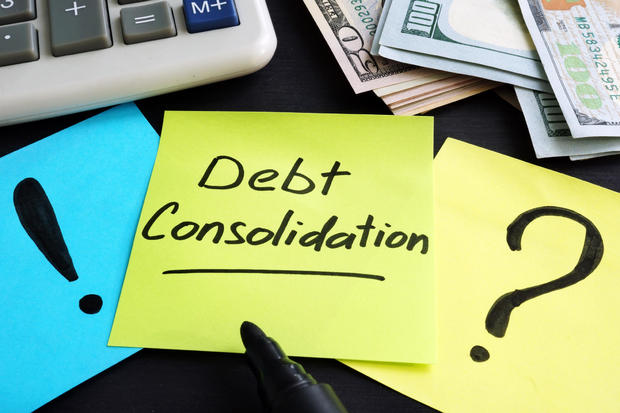Debt consolidation vs. debt settlement: Which option is right for you?
Inflation continues to hit the economy and Americans' wallets. Some have turned to credit to help make ends meet.
The Federal Reserve Bank of New York reports household debt climbed $212 billion in the fourth quarter of 2023 and now stands at $17.5 trillion. Credit card debt, in particular, soared $50 billion to a record $1.13 trillion in debt.
Consumers with credit card debt have been hit hard by the Federal Reserve's aggressive interest rate hikes meant to curb inflation. The agency says the average credit card annual percentage rate is a whopping 22.63%. For those who carry credit card debt from month to month, the compounding effect of interest rates makes it difficult to pay down high-interest credit card debt. Not surprisingly, delinquency rates are up, with 6.4% of all accounts 90 days past due.
Against this backdrop, many borrowers find themselves looking for help. Debt consolidation and debt settlement are two debt relief options that may help consumers tackle debt, though each is uniquely different. Below, we'll examine these two strategies in detail to help you decide if one of them is the right choice for you.
Explore your top debt relief options online now and become debt-free.
Debt consolidation vs. debt settlement: Which option is right for you?
To better understand which of these options is best for you, it helps to know how they each operate.
What is debt consolidation?
Debt consolidation is an effective way to combine multiple debt accounts into a single account with one payment. Two common forms of debt consolidation are a personal loan and a 0% introductory APR balance transfer credit card:
- Debt consolidation loan: This type of personal loan can combine multiple credit card debt, medical bills and other types of debt into one loan, which you'll repay in regular monthly installments with a fixed interest rate. The big advantage of debt consolidation loans is that you can typically lower borrowing costs by paying off high-interest credit cards with a lower-rate loan. According to the recent Federal Reserve data, credit cards average a 22.63% interest rate annually compared to rates on a 24-month personal loan, which average 12.49%. Be aware that most consolidation loans charge an origination fee ranging from 1% to 12% of the loan amount for those with less than ideal credit.
- 0% introductory APR balance transfer credit cards: These credit cards offer a promotional 0% APR for a specific period, typically ranging from 12 months to 21 months. That might be long enough to zero out your balance or at least make a significant dent in your credit card debt. However, any remaining balance after the introductory period expires is subject to the card's standard interest rate, which can reach upwards of 20% or even 30% APR. These cards also charge a balance transfer fee, typically 3% to 5% of the transfer amount.
Debt consolidation can simplify your debt payments and substantially lower your interest charges. However, it can lead to more debt if you don't have a solid plan to avoid racking up debt on cards you pay off through consolidation.
Learn more about debt consolidation here now.
What is debt settlement?
Debt settlement is another option to tackle insurmountable debt, but understand the risks involved before proceeding. This strategy involves negotiating with your creditors to pay less than what you owe on your accounts. You can settle debts on your own or hire a debt settlement company to do it for you.
Understand, however, that debt settlement can negatively affect your credit score since your payment history makes up 35% of your FICO credit score. Additionally, debt settlement companies often advise you to stop making debt payments and use that money to save for a settlement amount, which can further damage your credit. Many financial experts recommend considering debt settlement as a last resort option that may help you avoid bankruptcy.
"Debt settlement can be a good option for some, but [it] may be out of reach for many," says Derek Jacques, bankruptcy attorney at The Mitten Law Firm. "On average, settlements tend to be around 50% of the total balance owed. So if you owe $10,000, you may have to fork over as much as $5,000 just to settle the debt, which is not a small amount of money for someone struggling financially."
The risk of additional debt
Whether you choose debt consolidation, debt settlement or another option, it's crucial to address the habits that led to high debt balances in the first place. Long-term financial stability is achievable when debt balances are minimal or non-existent. Aim to stop using credit and employ strategies to pay off your debt quickly.
Because of the potential for additional debt, some experts like Howard Dvorkin, chairman at Debt.com, recommend a debt management plan. "You consolidate your debts through a nonprofit credit counseling agency," says Dvorkin. "You get a free in-depth debt analysis from a trained credit counselor, and you make one monthly payment that covers the principle and drastically reduces interest rates on all your cards. It costs money to have those counselors working with you, but the fee dwarfs the savings."
Review some of your top debt relief options online today.
Should you consolidate or settle debt?
Debt consolidation is considered a better option than debt settlement for most people. For starters, you'll pay less in fees, and your interest rate could be substantially lower than what you're currently paying. And, in most cases, debt consolidation won't harm your credit much, if at all. In fact, your score could be positively impacted once you use the loan proceeds to pay off revolving debt balances.
If you don't qualify for a debt consolidation loan, consider a 0% introductory APR balance transfer credit card or other options, as debt settlement is a last option you might consider. As Jacques notes, "It can help avoid bankruptcy in some cases. Because you have settled the debt, you won't have your debts reported to collection agencies and you won't be sued for the debt."




